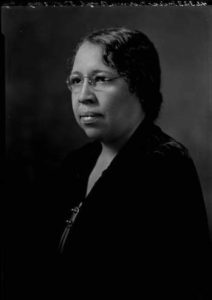
Norma Boyd
*Norma Boyd was born on this date in 1888. She was a Black teacher, public policy activist, and administrator.
Norma Elizabeth Boyd was born and educated in public schools in Washington, D.C. In September 1906, Boyd attended Howard University's College of Arts and Sciences, majoring in math. It was when only 1/3 of 1% of African Americans and 5% of whites of eligible age attended any college. Boyd graduated with a Bachelor of Arts degree in 1910. A lifelong learner, Boyd took graduate education and public relations courses at many universities.
At Howard University, Boyd was one of seven sophomore initiates of Alpha Kappa Alpha Sorority in February 1908. She served as the Alpha chapter's president at two different times. After some sisters left to start a sorority with a different focus, Boyd, Nellie Quander, Julia Evangeline Brooks, Minnie B. Smith, Nellie Pratt Russell, and Ethel Jones Mowbray incorporated Alpha Kappa Alpha on January 29, 1913. Boyd was the corresponding secretary on the first Directorate of Alpha Kappa Alpha. She also was a regional director of the North Atlantic Region. Boyd chartered the Xi Omega chapter in Washington, D.C., and was president. In 1934, she raised funds for the first year of Alpha Kappa Alpha's Mississippi Health Project.
For over thirty years, Boyd was an educator in public schools in Washington, D.C. Boyd would bring student council officers to congressional hearings to educate them about the political process. She retired from teaching in 1948. In 1938, Boyd established the "Non-Partisan Lobby for Economic and Democratic Rights" (NPC), which lobbied Congress on public service, education, voting suppression, and employment related to Blacks. Later, the organization worked on civil, social, and political issues.
The NPC reviewed all congressional bills, providing comments to Congress when necessary. In addition, the Non-Partisan Council helped expand the Public Works Program, establish a minimum wage for laundry workers, and supported a continuation of the American Youth Act. Boyd chaired two symposia at Howard University during World War II: "Labor and Women in the War Effort," a three-day event, and "Defense Planning for the Future," a five-day conference. Also, the council lobbied for civil rights legislation. The Non-Partisan Council also lobbied agencies such as the Department of State, the United Nations, and national educational, scientific, and cultural organizations to draw attention to the need for integration.
They worked with the NAACP, The Urban League, The United Office and Professional Workers of America, The National Association of Graduate Nurses, the American Federation of Churches, the Colored Women's Club, the Brotherhood of Sleeping Car Porters and Auxiliary, and the New York Voter's League. Established in 1946, the American Council of Human Rights superseded the Non-Partisan Council. The organization was dissolved on July 15, 1948, by Supreme Basileus Edna Over Gray-Campbell.
For her efforts in creating and guiding the Non-Partisan Council, in 1948, Boyd was named "Woman of the Year in the Field of Legislation" by the National Council of Negro Women. Norma Boyd was a United Nations observer in 1949. She participated in several committees, such as the Advisory Committee to the American Delegate to the Inter-American Council of Women, the Pan-American Liaison Committee, and the East-West Association. In 1949, she traveled to South America as an observer at the Inter-American Commission of Women in Buenos Aires, Argentina.
As an observer, Boyd was interested in children's rights and supported Principle 10 of the Declaration of Human Rights. In 1959, Boyd established the Women's International Religious Fellowship. The organization, which consisted of women from diverse backgrounds and cultures, helped draw attention to children's safety and rights. She wrote an autobiography, A Love That Equals My Labor. Norma Elizabeth Boyd, the last surviving founder of Alpha Kappa Alpha (AKA), died in Washington, D.C., on March 14, 1985.